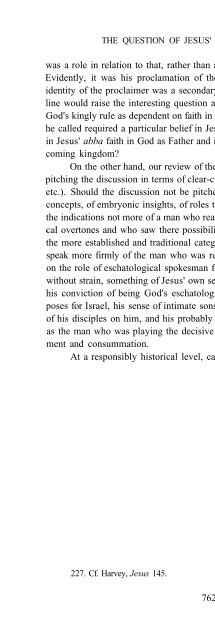Jesus Remembered: Christianity in the Making, vol. 1
Jesus Remembered: Christianity in the Making, vol. 1 Jesus Remembered: Christianity in the Making, vol. 1
THE QUESTION OF JESUS' SELF-UNDERSTANDING §16.6 was a role in relation to that, rather than an assertion of his own status as such. Evidently, it was his proclamation of the kingdom which was important; the identity of the proclaimer was a secondary matter. 227 To push further down that line would raise the interesting question as to whether Jesus saw faith regarding God's kingly rule as dependent on faith in him, whether the discipleship to which he called required a particular belief in Jesus. Or did it simply involve a sharing in Jesus' abba faith in God as Father and in his mission to live in the light of the coming kingdom? On the other hand, our review of the data has underlined the unwisdom of pitching the discussion in terms of clear-cut titles (the Messiah, the Son of Man, etc.). Should the discussion not be pitched rather in terms of more amorphous concepts, of embryonic insights, of roles taken on rather than titles claimed? Are the indications not more of a man who read/heard his Scripture with eschatological overtones and who saw there possibilities and patterns which broke through the more established and traditional categories? In which case, we can begin to speak more firmly of the man who was remembered as one who above all took on the role of eschatological spokesman for God. And from that we can deduce, without strain, something of Jesus' own self-understanding regarding that role — his conviction of being God's eschatological agent at the climax of God's purposes for Israel, his sense of intimate sonship before God and of the dependence of his disciples on him, and his probably strong hope for final acknowledgment as the man who was playing the decisive role in bringing the kingdom to fulfilment and consummation. At a responsibly historical level, can we say more? 227. Cf. Harvey, Jesus 145. 762
- Page 1512: THE QUESTION OF JESUS' SELF-UNDERST
- Page 1516: THE QUESTION OF JESUS' SELF-UNDERST
- Page 1520: THE QUESTION OF JESUS SELF-UNDERSTA
- Page 1524: THE QUESTION OF JESUS' SELF-UNDERST
- Page 1528: THE QUESTION OF JESUS SELF-UNDERSTA
- Page 1532: THE QUESTION OF JESUS' SELF-UNDERST
- Page 1536: THE QUESTION OF JESUS' SELF-UNDERST
- Page 1540: THE QUESTION OF JESUS' SELF-UNDERST
- Page 1544: THE QUESTION OF JESUS' SELF-UNDERST
- Page 1548: THE QUESTION OF JESUS SELF-UNDERSTA
- Page 1552: THE QUESTION OF JESUS' SELF-UNDERST
- Page 1556: THE QUESTION OF JESUS' SELF-UNDERST
- Page 1560: THE QUESTION OF JESUS' SELF-UNDERST
- Page 1566: PART FIVE THE CLIMAX OF JESUS' MISS
- Page 1572: THE CLIMAX OF JESUS' MISSION §17.1
- Page 1576: THE CLIMAX OF JESUS' MISSION §17.1
- Page 1580: THE CLIMAX OF JESUS' MISSION §17.1
- Page 1584: THE CLIMAX OF JESUS' MISSION §17.1
- Page 1588: THE CLIMAX OF JESUS' MISSION §17.1
- Page 1592: THE CLIMAX OF JESUS' MISSION §17.1
- Page 1596: THE CLIMAX OF JESUS' MISSION §17.1
- Page 1600: THE CLIMAX OF JESUS' MISSION §17.1
- Page 1604: THE CLIMAX OF JESUS* MISSION §17.1
- Page 1608: THE CLIMAX OF JESUS' MISSION §17.2
- Page 1612: THE CLIMAX OF JESUS' MISSION §17.2
THE QUESTION OF JESUS' SELF-UNDERSTANDING §16.6<br />
was a role <strong>in</strong> relation to that, ra<strong>the</strong>r than an assertion of his own status as such.<br />
Evidently, it was his proclamation of <strong>the</strong> k<strong>in</strong>gdom which was important; <strong>the</strong><br />
identity of <strong>the</strong> proclaimer was a secondary matter. 227 To push fur<strong>the</strong>r down that<br />
l<strong>in</strong>e would raise <strong>the</strong> <strong>in</strong>terest<strong>in</strong>g question as to whe<strong>the</strong>r <strong>Jesus</strong> saw faith regard<strong>in</strong>g<br />
God's k<strong>in</strong>gly rule as dependent on faith <strong>in</strong> him, whe<strong>the</strong>r <strong>the</strong> discipleship to which<br />
he called required a particular belief <strong>in</strong> <strong>Jesus</strong>. Or did it simply <strong>in</strong><strong>vol</strong>ve a shar<strong>in</strong>g<br />
<strong>in</strong> <strong>Jesus</strong>' abba faith <strong>in</strong> God as Fa<strong>the</strong>r and <strong>in</strong> his mission to live <strong>in</strong> <strong>the</strong> light of <strong>the</strong><br />
com<strong>in</strong>g k<strong>in</strong>gdom?<br />
On <strong>the</strong> o<strong>the</strong>r hand, our review of <strong>the</strong> data has underl<strong>in</strong>ed <strong>the</strong> unwisdom of<br />
pitch<strong>in</strong>g <strong>the</strong> discussion <strong>in</strong> terms of clear-cut titles (<strong>the</strong> Messiah, <strong>the</strong> Son of Man,<br />
etc.). Should <strong>the</strong> discussion not be pitched ra<strong>the</strong>r <strong>in</strong> terms of more amorphous<br />
concepts, of embryonic <strong>in</strong>sights, of roles taken on ra<strong>the</strong>r than titles claimed? Are<br />
<strong>the</strong> <strong>in</strong>dications not more of a man who read/heard his Scripture with eschatological<br />
overtones and who saw <strong>the</strong>re possibilities and patterns which broke through<br />
<strong>the</strong> more established and traditional categories? In which case, we can beg<strong>in</strong> to<br />
speak more firmly of <strong>the</strong> man who was remembered as one who above all took<br />
on <strong>the</strong> role of eschatological spokesman for God. And from that we can deduce,<br />
without stra<strong>in</strong>, someth<strong>in</strong>g of <strong>Jesus</strong>' own self-understand<strong>in</strong>g regard<strong>in</strong>g that role —<br />
his conviction of be<strong>in</strong>g God's eschatological agent at <strong>the</strong> climax of God's purposes<br />
for Israel, his sense of <strong>in</strong>timate sonship before God and of <strong>the</strong> dependence<br />
of his disciples on him, and his probably strong hope for f<strong>in</strong>al acknowledgment<br />
as <strong>the</strong> man who was play<strong>in</strong>g <strong>the</strong> decisive role <strong>in</strong> br<strong>in</strong>g<strong>in</strong>g <strong>the</strong> k<strong>in</strong>gdom to fulfilment<br />
and consummation.<br />
At a responsibly historical level, can we say more?<br />
227. Cf. Harvey, <strong>Jesus</strong> 145.<br />
762



